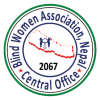Empowering Visually impaired women and Strengthening the Case management for evidence based advocacy justice(OSF)
Project purpose: Support strengthening the capacity of paralegals to serve visually impaired women,
Project Period: Sep 2019-Aug 2021.
Project Objectives:
a. Strengthen the case management systems of organization and enhance the capacity of community paralegals.
b. To promote access to justice for BVI women through legal aid mechanisms
Activities Conducted under this Period:
1. Legal aid service to women and girls with visual impairments
Legal aid service to BLIND AND VISUALLY IMPAIRED women/girls is one of the major interventions under this project. The objective of this activity is to support for the access to justice of BLIND AND VISUALLY IMPAIRED women who are economically poor, socially back warded and vulnerable. BWAN’s legal aid service have ranged from providing legal counseling, legal information to the court representation through free legal aid support with active engagement of legal practitioner. Providing legal aid services has help us to generate the evidences of challenges of the court and other formal justice institutions in delivering justice to BLIND AND VISUALLY IMPAIRED women and other Women with disabilities. BWAN has been providing legal aid support to blind and visually impaired women in the cases related to polygamy, domestic violence, property rights, rape and public sexual abuse, acquiring legal documents including citizenships and disability card, and so on.
2. Develop the case management system within the organization:
We have worked for strengthening the case management system of our organization. In this period, we have updated our previous case intake form so that more detailed and timely information can be acquired from the justice seeker during the case registration in the organization. For this, we have develop the case intake forms, computerize the forms, and have use it to document the cases and made its categorization. We will continue the strengthening of case management system of the organization during and beyond the project timeline.
3. Development of the Case Management Training Manual for paralegals
BWAN has developed and published training manual for the paralegal in both hard copy and accessible soft copy format to disseminate it to its network, community paralegals and to disability and women rights organizations. We are also planning to publish the paralegal manual in braille in the later part of the project.
4. Networking and Collaboration with the stakeholders
BWAN has conducted different meetings with the stakeholders including government and nongovernment stakeholders who can play significant role in advancing the access to justice for blind and visually impaired women. The purpose of the meetings and collaboration was to promote coordination and collaboration on the advocacy for the justice of cases of BLIND AND VISUALLY IMPAIRED women. The specific purpose of meetings were to build the network with the above institutions in referring the cases of BLIND AND VISUALLY IMPAIRED women, and to impart the information of BWAN’s services, intervention for the justice of BLIND AND VISUALLY IMPAIRED women.
5. Advocacy:
Advocacy for the justice of blind and visually impaired women is important strategy that has been adapted under this project. Under this project, BWAN has conducted the need based advocacy for the justice of blind and visually impaired girls/women demanded by the case as per its nature.
Outcomes
• Training manual for the paralegals (working with the cases of women with disabilities) has been developed
• 10 justice seekers women with disabilities have got counseling and legal aid support including support for the court action
• The monitoring and documentations of the cases of violence against blind and visually impaired women has become more systematic
• The case management system of the organization has been strengthened
• BWAN’s networking and collaboration with Organizations of Persons with Disabilities (OBTs), CSOs in the national and international level organizations and with the local government has been strengthened
